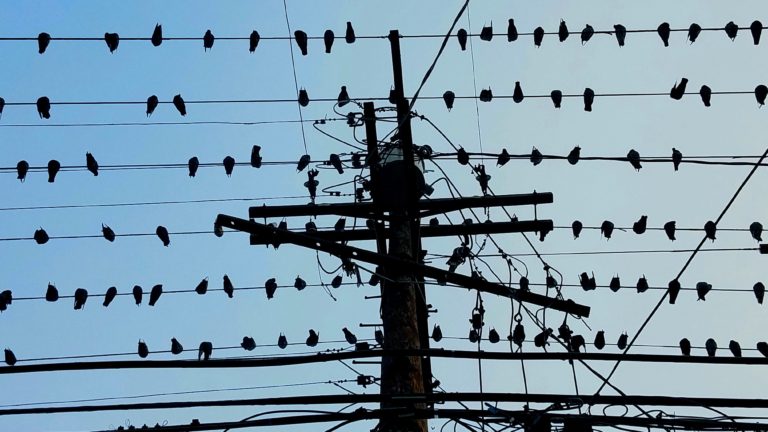Lenny Levine – Fiction
“It was my little secret that I was reaming out this stupid jerk. I liked that feeling.” He could see...

HEATHER’S PROBLEM
Julian Feldstein gazed across the room at the sad-eyed teenage girl in his patient’s chair and, once again, thought that this was the strangest case he’d ever taken on. It was hard to know how to approach it.
He’d been prepared for it, sort of, by his interview with the girl’s mother.
“Heather has never been much of a talker,” Agnes Carter explained as she sat across the desk from him. She was a woman in her fifties with short, brassy red hair and a matching shade of lipstick.
“When she was little, you had to practically plead with her to get her to say anything. But I was never concerned about it while she was growing up because some people just keep to themselves. Isn’t that true, Dr. Feldstein?”
Julian agreed that it was.
“Her father was also a man of few words.” She looked away, at some invisible space between them. “You know, they always say that keeping emotions inside isn’t good for your health.”
She looked back at him.
“Anyway, not talking much has always been typical of Heather, but now…” She drew a tissue from the box on his desk and blotted at her eyes. “…it’s taken this bizarre new turn.”
She wadded up the tissue and clenched it in her fist.
“Now, the only time she speaks is when someone else is talking. The rudest thing anyone can do, and she does it all the time. She just talks right over people like they weren’t even there. It’s so frustrating, Dr. Feldstein. You’ve got to convince her to stop.”
Julian nodded.
“So, you feel it’s something she does intentionally?”
“Oh, there’s no doubt about it, as far as I’m concerned. It’s some kind of teenage rebellion. But no one will have anything to do with her now.”
“When did it first start happening?”
“I don’t know, maybe six months ago. It wasn’t very often at first, so I really didn’t notice. But now, it’s constant. She never says a single word unless someone else is talking. It’s infuriating.”
Julian nodded again.
“I understand your husband passed away fairly recently, Mrs. Carter, and I’m sorry for your loss. Can I ask how long it’s been?”
“A little over a year now. But if you ask me, I don’t think Fredrick’s death had anything to do with Heather’s problem.”
He’d waited for her to go on, but evidently, that was all.
“Duly noted,” he’d said.
Now, as he glanced over at the girl sitting morosely in the chair and twisting her hands in her lap, he took a deep breath. She had yet to utter a word, silently following him into the office after he’d gone out to the waiting room to meet her. But he had to start some way, and this was the only way he could think of.
“Heather, I realize that you only speak while others are speaking,” he said. “I want you to know that I respect that. In this room, it’s perfectly okay.”
The girl eyed him warily.
“I mean that. Feel free to interrupt me at any time. You can talk over me, you can shout over me, it’s all fine.”
The wary look remained.
“So I’m going to begin by asking you a few questions. After each one, I’ll continue talking so that you can answer if you want to. I don’t know what I’ll talk about, it’ll probably be gibberish, but it won’t matter. I want you to speak to me, and if that’s what it takes, that’s what I’ll do.”
Her look had now become quizzical, which gave him hope.
“I’ll be able to understand what you’re saying. I’ll be listening to you, even as I babble on. I’ve been trained to be a good listener, even with distractions, so I can do it. What do you say, Heather, do you want to give it a try?”
He then launched into the Gettysburg Address, speaking softly and looking at her expectantly.
She stared at him for a moment and then burst out laughing.
“Now we are engaged in a great civil war,” he went on as she laughed even harder.
Finally, choking back even more laughter, she managed to speak. “You’re fucking crazy, do you know that?”
“Maybe I am. But I take it you approve of this method of treatment? Testing whether that nation, or any nation so conceived and so dedicated—”
“Yes, yes, I approve of it.” She was still giggling.
“Well, that’s good. Now, your mother seems to think you’re doing this on purpose. Are you? We have come to dedicate a portion of that field—”
The laughter abruptly cut off.
“No! I am definitely not doing this on purpose. She thinks I am because whenever something’s wrong, her first instinct is to blame me for it.” Tears welled up in her eyes and her voice broke. “Believe me, Dr. Feldstein, I wish I was doing this on purpose.”
“Well, it was something I had to ask, and now we can move on. When was the first time it happened? As a final resting place for those who here gave their lives—”
She began to cry.
“I can’t remember.”
* * *
Heather came in for three sessions a week. She proved surprisingly willing to talk, almost eager. Julian recited Beatle lyrics (he was proud of his knowledge of Beatle lyrics), along with the multiplication tables, the soliloquy from Hamlet, and several repetitions of the Boy Scout Creed.
During one of the early sessions she’d told him that, as far back as she could remember, she’d been much closer to her father than her mother.
“The first time I ever heard the expression ‘good cop, bad cop’ I thought of my parents,” she said.
“What was your father like?” he asked. “I am the egg man. They are the egg men—”
“I guess you could say he was the strong, silent type. He didn’t talk much, but when he did, people listened to him. And he listened to them. He didn’t judge them the way my mother does.”
“What kinds of things did you and your father talk about? Semolina pilchard, climbing up the Eifel Tower—”
“I don’t know, stuff about school, my friends, movies. But sometimes, we didn’t have to talk at all. We could sit in a room together for the longest time and not say a word. We were on the same wavelength.”
She couldn’t remember the first time she’d lost control of it, when talking over people became involuntary. But she admitted that, at first, she did do it on purpose.
“One of my mother’s most annoying habits is that she never finishes a question. She’ll ask it, and then, before you can answer, she’ll ask it again. Then she’ll try to explain to you why she’s asking it. Then she’ll ask it again, and again. It drove me nuts.”
“So what did you do?” He began the lyrics to Norwegian Wood.
“I’d answer her while she was still going on and on with the question. She didn’t even notice; that’s how much she loves hearing herself.”
“But then, she did start to notice, right? She showed me her room—”
Heather smiled.
“Oh, yes. Then, she’d yell at me and call me rude and impolite, before telling me to speak up because she didn’t hear me.”
“And when did you first start talking over other people? She asked me to stay and she told me to sit anywhere—”
“I guess it was the second week of the fall semester. There was this obnoxious guy in my English Lit class who wouldn’t shut up. He’d raise his hand every other minute with some useless comment that didn’t make sense half the time. He had this phlegmy voice that was hard to listen to. So I started talking whenever he’d open his mouth.”
“What kind of things did you say? I sat on the rug, biding my time—”
“Oh, things like ‘Why don’t you shut up and sit down, you incredible asshole?’ Variations of that, as well as stuff about how motormouths like him are usually the dumbest people because they never listen to anyone.”
“And how did the other students react? She told me she worked in the morning—”
“They couldn’t hear me. It was a large lecture hall and we were pretty spread out. I kept my head down, stared at my notebook, and hardly moved my lips.”
“How did you feel while you were doing that? And when I awoke—”
She didn’t answer.
He finished Norwegian Wood and was halfway through the first verse of In My Life. She still hadn’t spoken.
“Heather? Is everything okay? But of all these friends and lovers—”
“It made me feel great.” Her voice was so soft he almost didn’t hear her.
“In what way did it make you feel great? And these memories lose their meaning—”
“It was my little secret that I was reaming out this stupid jerk. I liked that feeling.” He could see a solitary tear make its way down her cheek. “Maybe I liked it too much. Now I can’t stop doing it.”
Julian knew, of course, that it was more than that. It had started out with people who annoyed her; now it had become involuntary and was aimed at everyone. Why?
He encouraged her to talk about her father, whose death had certainly played a role in Heather’s condition, despite her mother’s opinion to the contrary.
Julian had googled Fredrick Carter before the first session. He’d been an attorney for a high-powered law firm, the kind of stressful occupation that typically led to heart disease.
Heather was more than willing to talk about him; in fact, she loved to. But when it came to his illness, she said very little. “He had really high blood pressure and cholesterol, and they just couldn’t get it down,” was about all she’d say.
He asked her how she first got the idea to talk over her mother’s questions. Did it happen in the moment, or had she been thinking about it beforehand?
He recited a multiplication table as she considered.
“I don’t think I planned it.” She smiled. “Maybe it was that game my dad and I used to play when I was five years old. It was something he’d made up, called “You Talk, I Talk.”
“How did it work? Four, eight, twelve, sixteen—”
“Just how it sounds. When one of us would talk, the other one would immediately start talking at the same time. Well, I thought it was the greatest thing ever, and I’d beg him to play it with me. But he always reminded me that it was our private game, and that it was wrong to do it to anyone else. Each time we played it, he made me promise I’d always remember that.”
She began to laugh, but it was more like a whimper.
“Some liar I turned out to be, huh?”
* * *
“Tell me about your friends.” This was during another session as he recited the Boy Scout Creed. “What are they like?”
“I don’t have any friends. They won’t have anything to do with me since this started happening.”
“Then tell me what they were like before it started happening. For instance, who was your best friend? To do my duty—”
“Barbara Scott.” Her voice was tinged with regret. “We used to hang together all the time. She’s gorgeous, the head of the cheerleading squad. We had to constantly avoid all the boys that followed her around, wanting to talk to her.”
“Did you feel any envy about that? To keep myself physically strong—”
“No, none at all. Those boys were idiots.”
“How did she react to your problem? A Scout is trustworthy, loyal—”
Heather’s face became pinched.
“Actually, she was the first one who abandoned me. We had this big fight.”
He waited for her to go on, switching to the soliloquy from Hamlet, but she said nothing.
“Because of the problem?” he finally asked. “Whether ’tis nobler in the mind—”
“No, it wasn’t that. It was because of…” She paused, then looked at him helplessly. “Can you believe it? I don’t know.”
Julian believed it. He also believed they had come to an event that was of critical importance.
“When did this take place? Or to take arms against a sea of troubles—”
“I think it was just after Thanksgiving, I’m not sure.”
Which, he thought, would put it right about the time the problem began.
“Do you remember where you were? And by a sleep to say—”
“We were at her house, up in her room. We were supposed to be studying for the Chemistry final. It’s funny, I remember all that but I can’t remember what we were fighting about. Isn’t that weird?”
“Not if there’s a reason for it, and there’s always a reason. We just have to figure out what it is. How did your friends in general relate to your parents? ’Tis a consummation devoutly to be wish’d—”
“They liked them. They never saw the obnoxious side of my mother because she could be very charming when she wanted to, and they thought my dad was totally cool.”
“Did they ever hang out at your house? For in that sleep of death—”
“Sure, they were there all the time. My dad put in this huge playroom in the basement. Ping pong table, pool table, dart board, TV, the works. Our house was practically a community center for my friends.” She sighed.
“Let’s get back to your fight with Barbara Scott. You were in her room, supposedly studying for the Chemistry final. Were you, in fact, studying? When we have shuffled off this mortal coil—”
She smiled. “No, we weren’t. I don’t remember much, but I’m sure about that. We always used studying together as an excuse. We’d mostly just gossip and do riffs on people we knew. You, know, stuff everyone thinks teenagers do all the time.”
“I see. So the problem hadn’t yet started. For those who would bear the whips and scorns—”
She shook her head. “No, I guess not.”
“You said the two of you did riffs on people. Can you think of anyone you might have riffed on that day?” He’d done all he knew of the soliloquy, so it was back to the Beatles. “In Penny Lane there is a barber showing photographs—”
Suddenly, Heather gasped. She sat bolt upright and stared at him.
“What did you say? What did you just say?”
He was caught off guard. “Nothing, just some Beatle lyrics.”
She collapsed back into the chair and covered her face with her hands.
“I remember. Oh, God, I remember everything!”
* * *
It took Julian a moment to realize that he hadn’t been speaking while she said that. He sat there, unsure, but instinctively giving her space.
“It’s okay, Heather, take your time,” he said. “It’s okay.”
Finally, she looked up at him. He stayed silent. If she still couldn’t speak he’d go back to the Beatles. Just not Penny Lane.
Heather could speak. Her voice was nearly toneless.
“She told me my dad was a pig. A lecherous pig.”
Julian’s reaction was instinctive.
“That’s horrible. Why would she say that?”
He waited, through a long silence.
“Because it’s true.”
Heather lowered her eyes. “She told me how he came on to her whenever she was at our house, how he’d ‘accidentally’ brush against her if they passed each other, or how he’d casually stroke her arm while he was talking to her. She told me all sorts of things he did, worse things.”
“And did you believe her?”
“No, of course not! I was furious at her! But then, she…” Heather’s voice caught in her throat. “…she showed me these pictures of him on her phone. Awful, disgusting pictures of himself that he sent her. Oh, God!” She hid her face in her hands and softly wept.
He gave her all the time she needed, until she was able to compose herself.
“What made you remember?” he asked her.
She gave a bitter laugh. “When you were reciting those words, Dr. Feldstein, I thought you said ‘Barbara showing photographs.’ Isn’t that something?” Her face seemed to melt, and she began to sob. “Oh, God, what am I going to do?”
Even though there are tissues next to the patient’s chair, he got up and brought some of his own over to her. She took them gratefully.
“Here’s what you’re going to do, Heather,” he said as he returned to his chair, “you’re going to get through this. And you know why? Because the hardest issues to solve are the ones we bury inside. You just dug up a big one. It may look frightening in the light of day, but now we can see it. And if we can see it, we can deal with it.”
She nodded tentatively, wiping at her eyes.
“Did you notice that your original problem is gone? You don’t need to talk over me anymore. That’s a good start, isn’t it?”
She shrugged with a flicker of a smile.
“You’re going to be okay, Heather. I know this is a lot to handle, as it would be for anyone, but I’m certain that you’ll be fine.” He couldn’t help noticing by the clock that they were nearing the end of the session. It made him sad, as it often did.
“But now, I’m afraid we’ll have to stop for a while; that’s what always seems to happen. But we’ll pick it up next time, and, as always, you can call me twenty-four, seven, any hour of the day or night if you ever need to talk over anything.”
Heather rose from the chair and the flicker of a smile returned.
“You mean, if I ever need to talk over anyone,” she said.
In that moment, Julian thought he’d never felt more proud of a patient.
You can learn more about Lenny by clicking on the bio: https://thievingmagpie.org/lenny-levine-bio/



